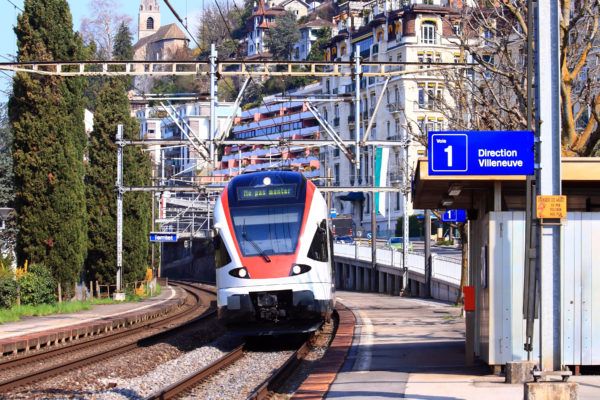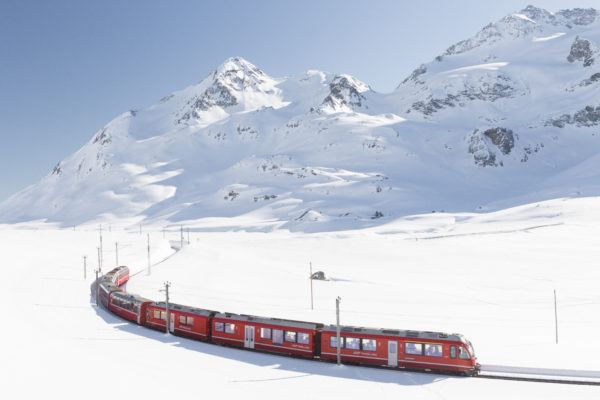Published by Jeremy. Last Updated on August 25, 2022.
Disclaimers: Our site uses demographic data, email opt-ins, display advertising, and affiliate links. Please check out our Terms and Conditions for more information. Listed prices and attraction details may have changed since our visit and initial publication.
For our stay in Europe, we purchased a 10-segment Eurail Select Pass that was valid in 4 countries (France, Switzerland, Austria, and Italy) over a period of two months.
Our research into this topic showed that our route was cost effective for the ten most expensive rail segments out of the fourteen we were planning to take. However, since purchasing our rail pass we realized one little error that we did not account for in our first analysis, and that it is the major headache (and cost) that comes with making Eurail reservations for seat assignments ahead of time.
After making our reservations, we realized that there are a lot of subtle intricacies required when booking reservations with a Eurail Pass. Since the need for reservations and their corresponding fees aren’t necessary for everyone, this guide was born. For those like us who are traveling during peak season or are uneasy with winging it for popular rail routes, this one is for you.
✈️ Book Your Next Trip
- • Planning a trip? Find a flight deal.
- • In need of a room? Check out hotel and Airbnb prices.
- • Taking a cruise? Find a cruise itinerary for your journey.
- • Don't overlook picking up a rental car or day tours as well!
When to Make a Eurail Reservation, or Not?
For the most part, it is a fairly popular thought that you do not have to make a reservation with your eurorail pass at any time of the year.
As we traveled in peak season in some of the most heavily visited countries in the continent, we often look at that statement with a bit of bewilderment. Hostels book up months in advance, and Europe’s trains are no better- pass or not.
Blame our adverseness to risk, or our need to get out of the Schengen Zone fast, but getting stuck in a city for an extra few hours or days was not something we could consider.
Since we decided to reserve as many trains in advance as we could, we actually discovered a few facts that are useful for all travelers on the Eurail system- all of which deal with the often overlooked detail of seat reservations.
1. Mandatory Eurail Reservations
There are many cases when a reservation on a train is compulsory for all travelers, not just holders of a rail pass.
These are cases where you are on a high-speed train like our Paris to Bordeaux route, an overnight train with sleeper cabin, premium lines like our Panoramic Trains in Switzerland, or other low-frequency, high-demand routes.
As is the case with all reserved trains, the number of tickets allocated to rail pass holders is low, and if you miss it you will be out of luck!
2. Possible to Reserve, Non-Resevation Sections Available
Apart from the premium trains above, most of the more conventional trains in Europe operate under a structure of combining reserved and non-reserved seating sections.
In this set up only a fraction of the cars on these trains will be available for early reservations with seat assignments. In similar fashion, the number of tickets allocated for rail passes holders is limited.
But where you would be out of luck in a premium train, you may have no issue showing up the day of departure and getting a ticket for the non-reserved seating section while using your rail pass.
The issue with this option is determining just how many seats are in the non-reserved category as this is a number that is not often published for a specific route. We were on many popular routes where people were filling the aisles in standing room early as they tried and failed on this one.
3. No Reservations Required or Allowed
In a third category of trains, especially when the route is on a domestic line and of short duration, you simply cannot reserve a seat at all. The perk with these train routes is that in their short duration they are also met with more frequent departures, making the ability to get a seat an easy task. If on the off-chance a train is full when you get there, the next one is likely only 30 to 60 minutes away.
So what does this all mean for you as a rail pass traveler? Mass confusion.
In trying to determine which trains are required to book in advance, not required but highly recommended, or are completely free to travel without reservation, we gave up. The issue is not so much finding information, but rather that you’ll find page after page of conflicting information as you go.
One source says there is non-reserve seating, others say it is compulsory. One traveler says they got on no problem, another had an issue and missed a day of traveling because of it. After all of the stress and hours of research, we decided just to book them all to get it over with.
Even with such a blanket decision, the headaches had only just begun.
Oh, and to add another level of confusion into the mix, there are some private train networks that go to the small mountain towns in Europe that your rail pass may not be valid on at all! We got caught on one without a ticket and had to pay the ticket-taker the train fee right there. Good thing we had cash.
Many Booking Services Exist, Few Are Useful
One of the frustrations we had with using our Eurail Pass was figuring out where we could reserve our tickets. Sure, 3rd party sites exist that let you reserve seats for just about every country, but their reservation fees also include a premium for their service. In trying to be thrifty we wanted to source as many “minimal fee” tickets in advance as we were traveling during peak season on many busy routes in Europe.
You’d think that in this day there would be an easier system for reserving tickets, but there is not. The theme of information overload like in the previous section is just as true in the booking process.
As it turns out, each country offers their own “official” booking service for sourcing tickets in advance and their rules are all different.
Some can only be done at train stations while others can be done online. A few can be done online, but only if you are traveling domestically and not crossing a border. Others have phone services but require calls to an international number, several minutes on hold, and their own set of rules like the previous categories.
The worst case, as we found out with a few online services, is that the booking process works for regular tickets, but the category for a rail pass reservation is just not even offered!
Since you will likely not be in Europe 60 to 90 days before your intended departure date (when tickets go live), able to hold indefinitely on international calls, or travel on pure domestic routes every single train ride, you will likely be out of luck in booking in advance without a premium 3rd party service a good majority of the time.
If we would have accepted that at the beginning, our headaches would not have happened.
Where to Book? Go Direct with Eurail
As all of the direct booking options can be convoluted, we are happy to report that Eurail recently added a reservation option for pass holders only that is convenient and gets rid of all of the headaches in exchange for a reservation fee.
Other than booking through services like Eurail, a number of private and government-run websites are available for travelers who meet certain criteria. A few we discovered during our booking process are the following:
- Switzerland Rail
- Swiss Panorama Trains (Golden Pass, Glacier Express) – Able to make reservations online using a Swiss Pass with no issue (see Disclaimer at end of post)
- German Rail – Able to book online for segments without a Eurail pass. Unable to reserve over the phone for Eurail Pass for border crossings although other sources suggested it was possible.
- Italian Rail – Although we could book online, we have not decided to make reservations in advance due to our itineraries being relatively short and frequent legs.
For your own itinerary, it is worth consulting your intended country’s train companies to see if any additional services exist to book your tickets for a cheaper rate as each country has their own booking mechanism and associated fees. However, if you want to skip the research step booking directly on Eurail will likely be the easiest and save time and headaches.
Does a Eurail Pass Save Money?
When we first published this article, we had a breakdown of the cost of our Eurail pass versus purchasing tickets individually and with/without reservation fees.
Unfortunately, as prices change frequently this became outdated rather quickly and we are unable to update every single time a price changes or due to seasonal variations.
In general, what we found is that to make a rail pass a viable option, you should be traveling on numerous segments and on far distances. The more, longer segments you do, the more likely you’ll save money with a pass.
If sticking to shorter routes and fewer segments, odds are good booking one-off tickets on sites like Omio may be the most cost-effective. But, unfortunately, the only way to know for sure is to do the research and compare them with the ticket plus reservation fee costs with a Eurail pass for your specific route!
To read our review of the Europe rail pass, with a cost analysis updated for 2018, click the previous link!
For frequently asked questions about the Eurail Pass, check out the following.
Are reservations required when using a Eurail Pass?
Some trains and routes require advanced reservations and others do not so it is worth researching your specific routes to know for sure. We recommend reservations especially during peak travel as trains can be quite full.
Is a Eurail Pass worth the money?
Generally speaking, the more frequently you travel and the longer distances you go, the more money you’ll save with a Eurail Pass. Shorter trips with more centralized routes may not offer much in terms of savings.
How far in advance should I make reservations?
Train seats book up in advance just like hotels do. The earlier you can book, especially during peak travel times, the better.
About Jeremy

About the Author: Jeremy is a full-time travel writer based in Pittsburgh and primary author of this site. He has been to 80+ countries on five continents and seeks out new food, adventure activities, and off-the-beaten-path experiences wherever he travels.




All of the above. Wasted nearly $4000 what an absolute lot of rubbish.
It was our bucket list.
Wasted days trying to get satisfaction in Europe. Our Travel agent still trying to sort out after 6 mths.We are being given the runaround by these people.
Thank you for this article, I’ve been trying to find information on reservations that make sense. Eurail.com offers reservations and will give an e-ticket (so no expensive shipping fee), do you have a perspective on how that differs from Rail Europe?
From what I understand Eurail is more direct while Rail Europe is a reseller that curates options.
great tips!
Great analysis, I appreciate your leg work and cost comparison charts. At least I didn’t feel alone in my misery. I just bought Eurail passes for a shorter, 2-week trip mostly through Italy and France (a “special deal” of buy 5, get one day free; plus a saver pass for traveling together and a youth pass). I had started to do the same research to compare costs of tickets verses passes plus reservations; It seemed to come out even or a little ahead on passes… but as I plan, I’m beginning to wonder. One nefarious thing about Rail Europe, in addition to their hefty “mailing fee” is that they also do not show the regular (non-resv) train schedules… they seem to want to only show you the “reservations required” ones. After much research, I finally learned that a Geneva-Venice train reservation nets me the the shortest time of about 7 hours, vs. any other circuitous route with multiple train changes, averaging between 12-20 hours. So, you suck it up and pay $72 pp resv. fee, plus shipping, in addition to rail pass (whereas a point-to point ticket is only 128). Perhaps I need to give this pricing job over to my CPA! I’d be really curious on anyone’s analysis on booking “reserved trains” when in country… especially France. How “limited” are they? Like you, we don’t have time to play around with waiting an extra day here and there, we’re pretty scheduled, so off I go to make the reservations for the faster trains…
In 1979 as a student, I traveled on an Interrail pass and I think we made it more than worthwhile, especially including boats to Sardinia, Patras, and Crete; still remember hustling it back to Paris from Athens and on the last leg Germany-France being charged a “surplus” or risk getting kicked off the train… and only having drachma which they had no interest in accepting. It would have been a great “Amazing Race” episode with us frantically running through train cars trying to exchange currencies to get the right amount in Marks or Francs. We were too young, naive and pre-internet to know better.
I’d be interested in knowing others experience about booking in country as well. I suspect that it is going to be hard, depending on the time of year, because every train I’ve been on was completely booked in the cabins I walked through. I know that isn’t a global experience and just a selection of the mostly-tourist trains and routes I’ve been on, but it is a start. I’m sure there has to be ways around like you said, but as a traveler the headaches + time to find it + all of the other logistics could not be worth the effort. If it were me, I’d honestly consider looking into buses after that just because, well, while convenient the trains do start to push my patience there. It is not like Japan where you get a rail pass, can hope on any train you want, whenever, and are good to go always.
Great story from 1979! It sounds like an amusing time now, but I bet it was incredibly frustrating at the time. Funny how all the bad stories end up being the best years down the road?